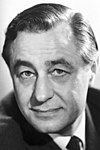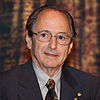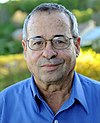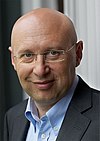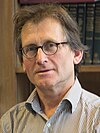List of Nobel Prize Winners in Chemistry
The Nobel Prize for Chemistry has been awarded annually since 1901 and has been endowed with 9 million Swedish kronor (approx. 868,000 euros) since 2017 . The selection of the laureates is made by the Royal Swedish Academy of Sciences . The founder of the prize, Alfred Nobel , decreed in his will of November 27, 1895, in which the award of the award was regulated, that the Nobel Prize for Chemistry should be awarded to "those who have made the most important chemical discovery or improvement". The Nobel Prize is presented each year by the King of Sweden on the anniversary of Alfred Nobel's death, December 10th.
Since the first Nobel Prize was awarded, the prize has been awarded a total of 111 times. A total of 183 people were honored, including 178 men (97.3%) and five women (2.7%). Frederick Sanger was the only one to receive the Nobel Prize in Chemistry twice. From 1901 to 2019, the prize was awarded to one person 63 times. 23 times it was split between two people and 25 times between three people. Eight times the prize was not awarded, the last time in 1942.
List of award winners
This list contains a chronological overview of the winners of the Nobel Prize in Chemistry with the reasons for the Nobel Committees. The category Nobel Prize Winners in Chemistry provides an alphabetical overview .
|
1901–1910 ·
1911–1920 ·
1921–1930 ·
1931–1940 ·
1941–1950 ·
1951–1960 |
1901-1910
| year | person | country | Reason for awarding the prize | image |
|---|---|---|---|---|
| 1901 |
Jacobus Henricus van 't Hoff (1852–1911) |
|
"In recognition of the extraordinary merit he has earned through the discovery of the laws of chemical dynamics and osmotic pressure in solutions" |
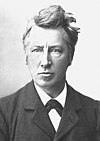
|
| 1902 |
Emil Fischer (1852-1919) |
|
"In recognition of the extraordinary merit he has earned through his synthetic work in the field of sugar and purine groups " |

|
| 1903 |
Svante August Arrhenius (1859-1927) |
|
"In recognition of the extraordinary merit he has earned through his theory of electrolytic dissociation for the development of chemistry" |
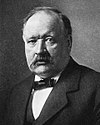
|
| 1904 | Sir William Ramsay (1852-1916) |
|
"In recognition of the merit he has earned through the discovery of the indifferent gaseous basic substances noble gases in the air and the determination of their place in the periodic system " |

|
| 1905 |
Adolf von Baeyer (1835-1917) |
|
"In recognition of the service he has earned in the development of organic chemistry and the chemical industry through his work on organic dyes and hydroaromatic compounds" |

|
| 1906 |
Henri Moissan (1852-1907) |
|
"In recognition of the great merit he has earned through his investigation and isolation of the element fluorine and through the introduction of the electric furnace named after him into the service of science" |
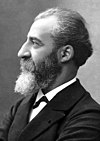
|
| 1907 |
Eduard Buchner (1860-1917) |
|
"For his biochemical investigations and the discovery of cell-free fermentation " |
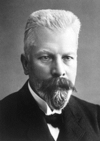
|
| 1908 |
Ernest Rutherford (1871-1937) |
|
"For his investigations into the decay of the elements and the chemistry of radioactive substances" |

|
| 1909 |
Wilhelm Ostwald (1853-1932) |
|
"In recognition of his work on catalysis as well as for his fundamental studies of chemical equilibrium conditions and reaction rates " |
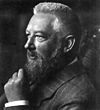
|
| 1910 |
Otto Wallach (1847–1931) |
|
"In recognition of the service he has earned in the development of organic chemistry and the chemical industry through his pioneering work in the field of alicyclic compounds " |

|
1911-1920
| year | person | country | Reason for awarding the prize | image |
|---|---|---|---|---|
| 1911 |
Marie Curie (1867-1934) |
|
“In recognition of the merit she has earned in the development of chemistry through the discovery of the elements radium and polonium , through the characterization of radium and its isolation in a metallic state, and through her investigations into the nature and chemical compounds of this important element " |
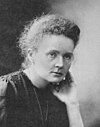
|
| 1912 |
Victor Grignard (1871-1935) |
|
"For the so-called Grignard's reagent that he discovered , which has greatly promoted the progress of organic chemistry in recent years" |

|
|
Paul Sabatier (1854–1941) |
|
"For his method of hydrogenating organic compounds in the presence of finely divided metals , whereby the progress of organic chemistry has been promoted to a large extent in recent years" |

|
|
| 1913 |
Alfred Werner (1866-1919) |
|
"On the basis of his work on the bonding relationships of the atoms in the molecule, which has clarified older research areas and opened up new ones, especially in the field of inorganic chemistry " |
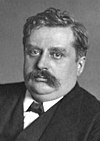
|
| 1914 |
Theodore William Richards (1868–1928) (awarded 1915) |
|
"In recognition of its precise determinations of the atomic weight of numerous chemical elements" |

|
| 1915 |
Richard Martin Willstätter (1872–1942) |
|
"For his studies of the dyes in the plant kingdom, especially the chlorophyll " |

|
| 1916 | not awarded | |||
| 1917 | not awarded | |||
| 1918 |
Fritz Haber (1868–1934) (awarded 1919) |
|
"For the synthesis of ammonia from its elements" ( Haber-Bosch process ) |

|
| 1919 | not awarded | |||
| 1920 |
Walther Hermann Nernst (1864–1941) (awarded 1921) |
|
"In recognition of his thermochemical work" |
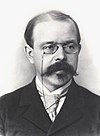
|
1921-1930
| year | person | country | Reason for awarding the prize | image |
|---|---|---|---|---|
| 1921 |
Frederick Soddy (1877-1956) (awarded 1922) |
|
"For his contributions to the knowledge of the chemistry of radioactive substances and his investigations into the occurrence and nature of isotopes " |
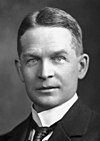
|
| 1922 |
Francis William Aston (1877-1945) |
|
"For his discovery of a large number of isotopes in several non-radioactive elements with the help of his mass spectrograph and for his discovery of the so-called law of integers" |

|
| 1923 |
Fritz Pregl (1869–1930) |
|
"For the microanalysis of organic substances developed by him " |

|
| 1924 | not awarded | |||
| 1925 |
Richard Adolf Zsigmondy (1865–1929) (awarded 1926) |
|
"For the elucidation of the heterogeneous nature of colloidal solutions as well as for the methods used, which are fundamental for modern colloid chemistry " |

|
| 1926 |
The Svedberg (1884–1971) |
|
"For his work on disperse systems " |

|
| 1927 |
Heinrich Wieland (1877–1957) (awarded 1928) |
|
"For his research on the composition of bile acid and related substances" |

|
| 1928 |
Adolf Otto Reinhold Windaus (1876–1959) |
|
"For his services to research into the structure of sterols and their connection with vitamins " |

|
| 1929 |
Arthur Harden (1865-1940) |
|
"For their research on sugar fermentation and the role of enzymes in this process" |

|
|
Hans von Euler-Chelpin (1873–1964) |
|
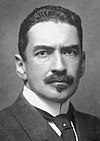
|
||
| 1930 |
Hans Fischer (1881–1945) |
|
"For his work on the structure of blood and plant pigments and for the synthesis of heme " |

|
1931-1940
| year | person | country | Reason for awarding the prize | image |
|---|---|---|---|---|
| 1931 |
Carl Bosch (1874–1940) |
|
"For their services to the discovery and development of high pressure chemical processes" |

|
|
Friedrich Bergius (1884–1949) |
|
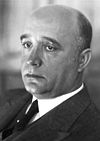
|
||
| 1932 |
Irving Langmuir (1881-1957) |
|
"For his discoveries and research in the field of surface chemistry " |

|
| 1933 | not awarded | |||
| 1934 |
Harold C. Urey (1893-1981) |
|
"For his discovery of heavy hydrogen " |

|
| 1935 |
Frédéric Joliot-Curie (1900-1958) |
|
"For their jointly performed representations of new radioactive elements" |

|
|
Irène Joliot-Curie (1897–1956) |
|

|
||
| 1936 |
Peter Debye (1884–1966) |
|
"For his contributions to our knowledge of molecular structures through his research on dipole moments, on the diffraction of X-rays and on electrons in gases" |

|
| 1937 |
Walter Norman Haworth (1883–1950) |
|
"For his research on carbohydrates and vitamin C " |

|
|
Paul Karrer (1889–1971) |
|
"For his research on carotenoids and flavins as well as vitamins A and B2 " |
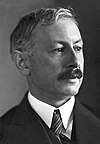
|
|
| 1938 |
Richard Kuhn (1900–1967) (awarded 1939) |
|
"For his work on carotenoids and vitamins " |
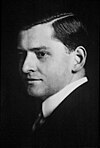
|
| 1939 |
Adolf FJ Butenandt (1903–1995) |
|
"For his work on sex hormones " |
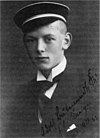
|
|
Leopold Ružička (1887–1976) |
|
"For his work on polymethylenes and higher terpenes " |

|
|
| 1940 | not awarded |
1941-1950
| year | person | country | Reason for awarding the prize | image |
|---|---|---|---|---|
| 1941 | not awarded | |||
| 1942 | not awarded | |||
| 1943 |
George de Hevesy (1885–1966) (awarded 1944) |
|
"For his work on the use of isotopes as indicators in the research of chemical processes" |

|
| 1944 |
Otto Hahn (1879–1968) (awarded 1945) |
|
"For his discovery of the fission of atoms " |

|
| 1945 |
Artturi Ilmari Virtanen (1895–1973) |
|
"For his investigations and discoveries in the field of agronomic and food chemistry , in particular for his method of preserving animal feed and forage plants" |

|
| 1946 |
James Batcheller Sumner (1887–1955) |
|
"For his discovery of the crystallizability of enzymes " |
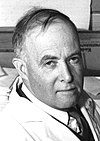
|
|
John Howard Northrop (1891-1987) |
|
"For their representation of enzymes and virus proteins in pure form" |
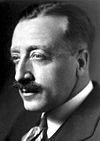
|
|
|
Wendell Meredith Stanley (1904–1971) |
|
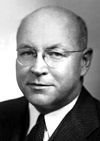
|
||
| 1947 |
Robert Robinson (1886–1975) |
|
"For his research on biologically important plant products, especially alkaloids " |
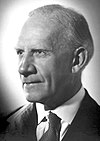
|
| 1948 |
Arne Tiselius (1902–1971) |
|
"For his work on analysis with the help of electrophoresis and adsorption , in particular for his discoveries about the complex nature of serum proteins" |

|
| 1949 |
William Francis Giauque (1895-1982) |
|
"For his contribution to chemical thermodynamics , especially for his investigations into the properties at extremely low temperatures" | |
| 1950 |
Otto Diels (1876–1954) |
|
"For their discoveries and the development of the diene synthesis " |
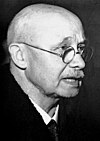
|
|
Kurt Alder (1902-1958) |
|

|
1951-1960
| year | person | country | Reason for awarding the prize | image |
|---|---|---|---|---|
| 1951 |
Edwin Mattison McMillan (1907-1991) |
|
"For their discoveries in the chemistry of the transuranium elements " |

|
|
Glenn T. Seaborg (1912-1999) |
|
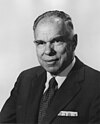
|
||
| 1952 |
Archer JP Martin (1910-2002) |
|
"For their invention of distribution chromatography " |

|
|
Richard LM Synge (1914–1994) |
|
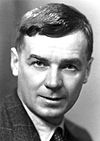
|
||
| 1953 |
Hermann Staudinger (1881–1965) |
|
"For his discoveries in the field of macromolecular chemistry " |

|
| 1954 |
Linus Pauling (1901-1994) |
|
"For his research on the nature of chemical bonds and their application to elucidate the structure of complex substances" |
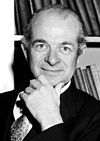
|
| 1955 |
Vincent du Vigneaud (1901–1978) |
|
"For his work on the biochemically important sulfur compounds , especially for the first synthesis of a polypeptide hormone" |

|
| 1956 |
Cyril Norman Hinshelwood (1897–1967) |
|
"For their research on the mechanisms of chemical reactions " |

|
|
Nikolai Nikolajewitsch Semjonow (1896–1986) |
|

|
||
| 1957 |
Alexander Robertus Todd (1907-1997) |
|
"For his work on nucleotides and co-enzyme nucleotides" |

|
| 1958 |
Frederick Sanger (1918-2013) |
|
"For his work on the structure of proteins, especially insulin " |

|
| 1959 |
Jaroslav Heyrovský (1890–1967) |
|
"For his discovery and development of the polarographic method of analysis" |

|
| 1960 |
Willard Libby (1908-1980) |
|
"For his method of using carbon 14 for age determination in archeology , geology , geophysics and other branches of science" (see: radiocarbon method ) |
1961-1970
| year | person | country | Reason for awarding the prize | image |
|---|---|---|---|---|
| 1961 |
Melvin Calvin (1911-1997) |
|
"For his research on the carbonic acid assimilation of plants" |

|
| 1962 |
Max Ferdinand Perutz (1914-2002) |
|
"For their studies on the structures of globulin proteins " |

|
|
John Cowdery Kendrew (1917-1997) |
|

|
||
| 1963 |
Karl Ziegler (1898–1973) |
|
"For their discoveries in the field of chemistry and the technology of high polymers " ( Ziegler-Natta process ) |
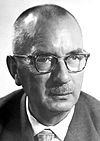
|
|
Giulio Natta (1903–1979) |
|

|
||
| 1964 |
Dorothy Crowfoot Hodgkin (1910-1994) |
|
"For their structure determination of biologically important substances with X-rays " | |
| 1965 |
Robert B. Woodward (1917-1979) |
|
"For his work in the field of natural product synthesis " |
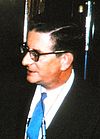
|
| 1966 |
Robert Mulliken (1896-1986) |
|
"For his fundamental work on chemical bonds and the electronic structure of molecules using the orbital method " |
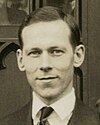
|
| 1967 |
Manfred Eigen (1927-2019) |
|
"For their investigations into extremely fast chemical reactions that are triggered by the destruction of the equilibrium with very short energy pulses" |

|
|
Ronald George Wreyford Norrish (1897–1978) |
|
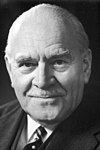
|
||
|
George Porter (1920-2002) |
|
|||
| 1968 |
Lars Onsager (1903-1976) |
|
"For the discovery of the reciprocal relationships named after him, which are fundamental for the thermodynamics of irreversible processes" |

|
| 1969 |
Derek HR Barton (1918-1998) |
|
"For your work in the development of the concept of conformation and its application in chemistry" | |
|
Odd Hassel (1897-1981) |
|

|
||
| 1970 |
Luis Federico Leloir (1906-1987) |
|
"For the discovery of sugar nucleotides and their function in the biosynthesis of carbohydrates " |

|
1971-1980
| year | person | country | Reason for awarding the prize | image |
|---|---|---|---|---|
| 1971 |
Gerhard Herzberg (1904–1999) |
|
"For his work on the electronic structure and geometry of molecules, especially free radicals " |

|
| 1972 |
Christian B. Anfinsen (1916–1995) |
|
"For his work on ribonuclease , in particular the connection between amino acid series and biologically active conformations " |
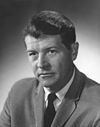
|
|
Stanford Moore (1913-1982) |
|
"For their contribution to the understanding of the connection between the chemical structure and the catalytic activity of the active center of the ribonuclease molecules" | ||
|
William Howard Stein (1911-1980) |
|
|||
| 1973 |
Ernst Otto Fischer (1918-2007) |
|
"For their pioneering work independently of one another on the chemistry of organometallic so-called sandwich compounds " | |
|
Geoffrey Wilkinson (1921-1996) |
|

|
||
| 1974 |
Paul Flory (1910–1985) |
|
"For his fundamental achievements, both theoretically and experimentally, in the physical chemistry of macromolecules " | |
| 1975 |
John W. Cornforth (1917-2013) |
|
"For his work on the stereochemistry of enzyme - catalysis reactions" | |
|
Vladimir Prelog (1906-1998) |
|
"For his research in the stereochemistry of organic molecules and reactions" |

|
|
| 1976 |
William Lipscomb (1919-2011) |
|
"For his work on the structure of boranes " |
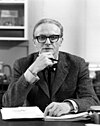
|
| 1977 |
Ilya Prigogine (1917-2003) |
|
"For his contribution to irreversible thermodynamics , especially to the theory of ' dissipative structures '" |

|
| 1978 |
Peter D. Mitchell (1920-1992) |
|
"For his contribution to the understanding of biological energy transfer through the development of the chemiosmotic theory " | |
| 1979 |
Herbert Charles Brown (1912-2004) |
|
"For their development of boron or phosphorus compounds in important reagents within organic syntheses" | |
|
Georg Wittig (1897–1987) |
|
|||
| 1980 |
Paul Berg (* 1926) |
|
"For his fundamental work on nucleic acid biochemistry, with particular reference to hybrid DNA " |

|
|
Walter Gilbert (* 1932) |
|
"For their contributions concerning the determination of base sequences in nucleic acids" |

|
|
|
Frederick Sanger (1918-2013) |
|

|
1981-1990
| year | person | country | Reason for awarding the prize | image |
|---|---|---|---|---|
| 1981 |
Fukui Ken'ichi (1918–1998) |
|
"For their independently developed theories about the course of chemical reactions " | |
|
Roald Hoffmann (* 1937) |
|

|
||
| 1982 |
Aaron Klug (1926-2018) |
|
"For the development of crystallographic methods for deciphering biologically important nucleic acid - protein complexes" |

|
| 1983 |
Henry Taube (1915-2005) |
|
"For his work on the reaction mechanisms of electron transfer , especially in metal complexes " |

|
| 1984 |
Robert Bruce Merrifield (1921-2006) |
|
"For his simple and ingenious method for the production of peptides and proteins " ( Merrifield synthesis ) |

|
| 1985 |
Herbert A. Hauptman (1917-2011) |
|
"For their excellent work in the development of direct methods for determining crystal structures " |

|
|
Jerome Karle (1918-2013) |
|

|
||
| 1986 |
Dudley R. Herschbach (* 1932) |
|
"For their participation in the dynamics of elementary chemical processes" |
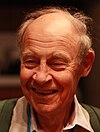
|
|
Yuan T. Lee (* 1936) |
|

|
||
|
John C. Polanyi (* 1929) |
|
|||
| 1987 |
Donald J. Cram (1919-2001) |
|
"For their development and use of molecules with structure-specific interaction of high selectivity" ( supramolecular chemistry ) | |
|
Jean-Marie Lehn (* 1939) |
|
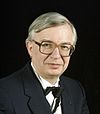
|
||
|
Charles Pedersen (1904-1989) |
|
|||
| 1988 |
Johann Deisenhofer (* 1943) |
|
"For the research of the reaction center of photosynthesis in a purple bacterium " | |
|
Robert Huber (* 1937) |
|
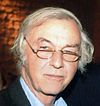
|
||
|
Hartmut Michel (* 1948) |
|

|
||
| 1989 |
Sidney Altman (born 1939) |
|
"For their discovery of the chemical process-accelerating properties of ribonucleic acid " ( ribozymes ) |
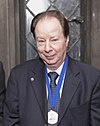
|
|
Thomas R. Cech (* 1947) |
|
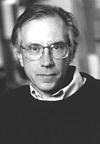
|
||
| 1990 |
Elias James Corey (* 1928) |
|
"For his formulation of important theories and developments of methods of organic synthesis" ( retrosynthesis ) |

|
1991-2000
| year | person | country | Reason for awarding the prize | image |
|---|---|---|---|---|
| 1991 |
Richard R. Ernst (* 1933) |
|
"For his contributions to the development of high-resolution nuclear magnetic resonance spectroscopy , a method for analyzing molecular structures" |

|
| 1992 |
Rudolph Arthur Marcus (* 1923) |
|
"For his important contributions to the theory of electron transfer reactions in chemical systems" ( Marcus theory ) |
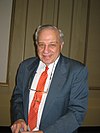
|
| 1993 |
Kary Mullis (1944-2019) |
|
"For his development of the polymerase chain reaction " |

|
|
Michael Smith (1932-2000) |
|
"For his development of a method to change ( mutagenesis ) the deoxyribonucleic acid on which the genetic information is stored" | ||
| 1994 |
George A. Olah (1927-2017) |
|
"For his research into carbocations " |
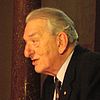
|
| 1995 |
Paul J. Crutzen (* 1933) |
|
"For her work on the chemistry of the earth's atmosphere , in particular on the formation and depletion of ozone " |
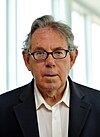
|
|
Mario J. Molina (* 1943) |
|
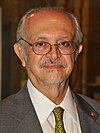
|
||
|
Frank Sherwood Rowland (1927-2012) |
|

|
||
| 1996 |
Robert F. Curl (* 1933) |
|
"For the discovery of fullerenes , also called buckyballs, a new form of carbon with spherical molecules" |
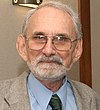
|
|
Harold Kroto (1939-2016) |
|

|
||
|
Richard E. Smalley (1943-2005) |
|
|||
| 1997 |
Paul Delos Boyer (1918-2018) |
|
"For the clarification of the synthesis of the high-energy molecule adenosine triphosphate (ATP)" |

|
|
John E. Walker (born 1941) |
|

|
||
|
Jens Christian Skou (1918-2018) |
|
"For the discovery of the ion-transporting enzyme sodium-potassium-ATPase " |

|
|
| 1998 |
Walter Kohn (1923-2016) |
|
"For his development of quantum chemical methods" |

|
|
John Anthony Pople (1925-2004) |
|
"For the development of methods with which the properties of molecules and their interaction in chemical processes can be theoretically researched" |

|
|
| 1999 |
Ahmed Zewail (1946-2016) |
|
"For his studies of the transition state of chemical reactions with the help of femtosecond spectroscopy " |

|
| 2000 |
Alan J. Heeger (* 1936) |
|
"For the discovery and development of conductive polymers " |

|
|
Alan MacDiarmid (1927-2007) |
|

|
||
|
Hideki Shirakawa (* 1936) |
|

|
2001-2010
| year | person | country | Reason for awarding the prize | image |
|---|---|---|---|---|
| 2001 |
William S. Knowles (1917-2012) |
|
"For her work on chirally catalyzing hydrogenation reactions " | |
|
Ryōji Noyori (* 1938) |
|

|
||
|
Barry Sharpless (born 1941) |
|
"For his work on chirally catalyzing oxidation reactions" (e.g. Sharpless epoxidation ) |
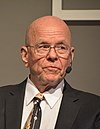
|
|
| 2002 |
John B. Fenn (1917-2010) |
|
"For their development of soft desorption / ionization methods for mass spectrometric analysis of biological macromolecules " |

|
|
Kōichi Tanaka (* 1959) |
|

|
||
|
Kurt Wüthrich (* 1938) |
|
"For his development of nuclear magnetic resonance spectroscopy to determine the three-dimensional structure of biological macromolecules in solutions" |
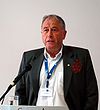
|
|
| 2003 |
Peter Agre (* 1949) |
|
"For the discovery of the water channels in cell membranes " |
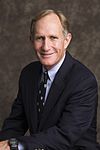
|
|
Roderick MacKinnon (* 1956) |
|
"For his structural and mechanical studies of ion channels in cell membranes " |

|
|
| 2004 |
Aaron Ciechanover (* 1947) |
|
"For the discovery of ubiquitin -controlled protein degradation " |

|
|
Avram Hershko (* 1937) |
|
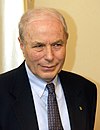
|
||
|
Irwin Rose (1926-2015) |
|

|
||
| 2005 |
Yves Chauvin (1930-2015) |
|
"For the development of the metathesis method in organic synthesis" |
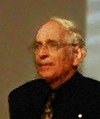
|
|
Robert Grubbs (* 1942) |
|

|
||
|
Richard R. Schrock (* 1945) |
|
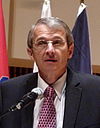
|
||
| 2006 |
Roger D. Kornberg (* 1947) |
|
"For his work on the molecular basis of gene transcription in eukaryotic cells " |

|
| 2007 |
Gerhard Ertl (* 1936) |
|
"For his studies of chemical processes on solid surfaces " |

|
| 2008 |
Osamu Shimomura (1928-2018) |
|
"For the discovery and further development of the green fluorescent protein " |

|
|
Martin Chalfie (* 1947) |
|

|
||
|
Roger Tsien (1952-2016) |
|

|
||
| 2009 |
Venkatraman Ramakrishnan (* 1952) |
|
"For the studies of the structure and function of the ribosome " |

|
|
Thomas A. Steitz (1940-2018) |
|

|
||
|
Ada Yonath (* 1939) |
|

|
||
| 2010 |
Richard F. Heck (1931-2015) |
|
"For palladium -catalyzed cross-couplings in organic synthesis " |

|
|
Ei-ichi Negishi (* 1935) |
|

|
||
|
Akira Suzuki (born 1930) |
|

|
2011-2020
|
1901–1910 ·
1911–1920 ·
1921–1930 ·
1931–1940 ·
1941–1950 ·
1951–1960 |
Distribution by country
Prize winners who were citizens of several ( ) countries at the time of the award are counted here in equal parts ( ) for all of these countries .
| nation | Number of Nobel Prize winners |
|---|---|
|
|
71 |
|
|
29.5 |
|
|
28 |
|
|
9 |
|
|
7th |
|
|
7th |
|
|
5 |
|
|
4th |
|
|
4th |
|
|
3.5 |
|
|
1.5 |
|
|
1 |
|
|
1 |
|
|
1 |
|
|
1 |
|
|
1 |
|
|
1 |
|
|
1 |
|
|
1 |
|
|
1 |
|
|
1 |
|
|
0.5 |
|
|
0.5 |
|
|
0.5 |
As of October 3, 2018
Web links
- Official list of Nobel Laureate in Chemistry (English)
- Information from the German Historical Museum
Individual evidence
- ↑ a b c d e f g h i j k l Country according to the information on nobelprize.org. The country may differ from the nationality of the laureate.
- ↑ The information in the Nobellists does not refer to the time Werner was born, but to the time when the prize was awarded. At the time of Werner's birth, Mulhouse was French, as it is today.
- ↑ a b c d The prize money was given to the funds of this prize category.
- ↑ a b c d One third of the prize money was given to the main fund and one third to the funds of this prize category.
- ↑ SPIEGEL Online, article on the Nobel Prize in Chemistry 2015 . There Sancar is named as the holder of both nationalities.
- ↑ Curriculum Vitae. (PDF) franklab.cpmc.columbia.edu, accessed on October 10, 2019 (English).
